We are the Godfather Of Talent. Our family comprises of four verticals which aims to bridge the gap between talent, their education, and their hunt for jobs.We aim to make India the Powerhouse Of Talent. ➡ Futurense US Pathway offers a never before heard of Historic US Master's Pathway with IITs/IIMs and Top US universities —with up to 65% scholarships, waiver on entrance exams, and a 3-year OPT. ➡ Futurense Uni is an aspirant's second chance to their IIT dream from the country's top IITs through three distinct degrees—A PG Diploma and Mtech in Data Engineering and Artificial Intelligence, India's first Tech-MBA, and a future-first MTech in VLSI design with AI and Intelligent Systems. Call us at +91 90354 25113 or contact us via mail: [email protected] more information visit our website: www.futurense.com
Don't wanna be here? Send us removal request.
Text
Top 6 Reasons to Study Abroad in Europe

Are you dreaming of world-class education but worried about soaring tuition fees? Or perhaps you’re eager to immerse yourself in vibrant cultures while gaining skills that employers value? Studying abroad in Europe could be your answer.
Read more: https://futurense.com/eup-blog-posts/top-6-reasons-to-study-abroad-in-europe
0 notes
Text
Best 5 Cities to Study in Europe for Indian Students

Europe has long been a magnet for Indian students seeking world-class education, cultural immersion, and career opportunities. With its blend of historic universities, multicultural cities, and affordable tuition fees, Europe offers an enriching environment for personal and professional growth.
Read more: https://articlewaves.com/best-cities-europe-study-indian-students/
0 notes
Text
Big Data Technologies You’ll Master in IIT Jodhpur’s PG Diploma

In today’s digital-first economy, data is more than just information—it's power. Successful businesses are set apart by their ability to collect, process, and interpret massive datasets. For professionals aspiring to enter this transformative domain, the IIT Jodhpur PG Diploma offers a rigorous, hands-on learning experience focused on mastering cutting-edge big data technologies.
Whether you're already in the tech field or looking to transition, this program equips you with the tools and skills needed to thrive in data-centric roles.
Understanding the Scope of Big Data
Big data is defined not just by volume but also by velocity, variety, and veracity. With businesses generating terabytes of data every day, there's a pressing need for experts who can handle real-time data streams, unstructured information, and massive storage demands. IIT Jodhpur's diploma program dives deep into these complexities, offering a structured pathway to becoming a future-ready data professional.
Also, read this blog: AI Data Analyst: Job Role and Scope
Core Big Data Technologies Covered in the Program
Here’s an overview of the major tools and technologies you’ll gain hands-on experience with during the program:
1. Hadoop Ecosystem
The foundation of big data processing, Hadoop offers distributed storage and computing capabilities. You'll explore tools such as:
HDFS (Hadoop Distributed File System) for scalable storage
MapReduce for parallel data processing
YARN for resource management
2. Apache Spark
Spark is a game-changer in big data analytics, known for its speed and versatility. The course will teach you how to:
Run large-scale data processing jobs
Perform in-memory computation
Use Spark Streaming for real-time analytics
3. NoSQL Databases
Traditional databases fall short when handling unstructured or semi-structured data. You’ll gain hands-on knowledge of:
MongoDB and Cassandra for scalable document and column-based storage
Schema design, querying, and performance optimization
4. Data Warehousing and ETL Tools
Managing the flow of data is crucial. Learn how to:
Use tools like Apache NiFi, Airflow, and Talend
Design effective ETL pipelines
Manage metadata and data lineage
5. Cloud-Based Data Solutions
Big data increasingly lives on the cloud. The program explores:
Cloud platforms like AWS, Azure, and Google Cloud
Services such as Amazon EMR, BigQuery, and Azure Synapse
6. Data Visualization and Reporting
Raw data must be translated into insights. You'll work with:
Tableau, Power BI, and Apache Superset
Custom dashboards for interactive analytics
Real-World Applications and Projects
Learning isn't just about tools—it's about how you apply them. The curriculum emphasizes:
Capstone Projects simulating real-world business challenges
Case Studies from domains like finance, healthcare, and e-commerce
Collaborative work to mirror real tech teams
Industry-Driven Curriculum and Mentorship
The diploma is curated in collaboration with industry experts to ensure relevance and applicability. Students get the opportunity to:
Attend expert-led sessions and webinars
Receive guidance from mentors working in top-tier data roles
Gain exposure to the expectations and workflows of data-driven organizations
Career Pathways After the Program
Graduates from this program can explore roles such as:
Data Engineer
Big Data Analyst
Cloud Data Engineer
ETL Developer
Analytics Consultant
With its robust training and project-based approach, the program serves as a launchpad for aspiring professionals.
Why Choose This Program for Data Engineering?
The Data Engineering course at IIT Jodhpur is tailored to meet the growing demand for skilled professionals in the big data industry. With a perfect blend of theory and practical exposure, students are equipped to take on complex data challenges from day one.
Moreover, this is more than just academic training. It is IIT Jodhpur BS./BSc. in Applied AI and Data Science, designed with a focus on the practical, day-to-day responsibilities you'll encounter in real job roles. You won’t just understand how technologies work—you’ll know how to implement and optimize them in dynamic environments.
Conclusion
In a data-driven world, staying ahead means being fluent in the tools that power tomorrow’s innovation. The IIT Jodhpur Data Engineering program offers the in-depth, real-world training you need to stand out in this competitive field. Whether you're upskilling or starting fresh, this diploma lays the groundwork for a thriving career in data engineering.
Take the next step toward your future with “Futurense”, your trusted partner in building a career shaped by innovation, expertise, and industry readiness.
Source URL: www.lasttrumpnews.com/big-data-technologies-iit-jodhpur-pg-diploma
0 notes
Text
Top 5 Generative AI Models You Should Know in 2025

Generative models are transforming the way industries operate, offering smarter solutions for content creation, problem-solving, and innovation. As 2025 approaches, knowing which models are leading the way can give students and professionals a clear advantage.
Read more: https://freshvoicehub.com/top-generative-ai-models-2025/
0 notes
Text
The Role of Mathematics in Data Science: Do You Really Need It?
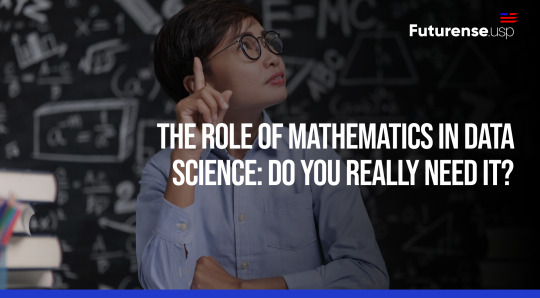
Introduction
As data science continues to transform industries, many aspiring professionals wonder about the academic foundation required to succeed. One common path is an Information Technology Management degree, which combines technical knowledge with business strategy. But a key question remains—how important is mathematics in this field? This blog breaks down the role math plays in data science and whether it’s a must-have skill for building a successful career.
Why Math is Considered Foundational in Data Science
Mathematics is the engine that drives data science. While tools and programming languages help process data, math enables professionals to understand patterns, draw insights, and build accurate models. If you’re pursuing a Master’s in information management, a solid grasp of key mathematical concepts is essential for applying theory to real-world problems.
Here’s why math is foundational in data science:
Statistics and probability help in making predictions and understanding data trends.
Linear algebra is crucial for machine learning models, especially in image and language processing.
Calculus plays a role in optimization and fine-tuning algorithms.
Discrete mathematics helps in logic building, algorithm design, and data structures.
Numerical analysis supports dealing with real-time data computations and error management.
A clear understanding of these areas gives data professionals a competitive edge and deepens their analytical capabilities.
Core Areas of Mathematics Used in Data Science
Mathematics is at the heart of data science. While coding and software tools make execution easier, the logic and theory that drive data models come from mathematical principles. If you’re pursuing a Master’s in Information Systems, understanding the core areas of mathematics can help you connect technical knowledge with strategic data insights.
Here are the primary branches of math used in data science:
1. Statistics and Probability
These are the building blocks of data analysis. They help in understanding data distributions, correlations, hypothesis testing, and predictive modeling.
2. Linear Algebra
Essential for machine learning and deep learning, linear algebra supports matrix operations, vector transformations, and dimensionality reduction techniques like PCA (Principal Component Analysis).
3. Calculus
Mainly used for optimization, calculus helps fine-tune algorithms by minimizing or maximizing functions—important in training machine learning models.
4. Discrete Mathematics
This area supports algorithm development, graph theory, and logical reasoning—key for structuring data-driven solutions.
5. Numerical Methods
Important for handling real-world data problems, such as approximations, simulations, and missing or noisy data.
Each of these disciplines contributes to building, evaluating, and improving the performance of data models. Understanding these mathematical tools allows professionals to move beyond surface-level data analysis and dive into more meaningful, scalable solutions that impact business decisions.
Can You Learn Data Science Without Strong Math?
Futurense believes that data science should be accessible to all, regardless of your math background. While mathematics enhances your understanding of data science, it shouldn’t be a roadblock. With the right guidance, resources, and learning structure, anyone can build a solid foundation in data science—even without being a math expert.
Many students pursuing an MS in information systems come from diverse academic backgrounds, including business, humanities, or IT. While they may not have in-depth math skills initially, structured learning pathways allow them to pick up the necessary concepts along the way.
Here’s how you can learn data science without a strong math foundation:
Focus on application-first learning—understand the “why” before diving into the “how.”
Use tools like Python, R, and libraries such as scikit-learn or pandas, which simplify complex computations.
Practice with real-world datasets to see the impact of algorithms visually.
Enroll in beginner-friendly courses like those offered by Futurense, which explain mathematical concepts through relatable examples.
Supplement your learning with basic math resources—only what’s required to understand models, not to become a mathematician.
In essence, while math helps, it’s not a prerequisite. With the right mindset and support, your journey into data science can be successful and rewarding, even without being a math whiz.
Also, read this blog: Master’s in MIS in the USA: A Comprehensive Guide
How to Strengthen Your Math for Data Science
Strengthening your math skills can significantly improve your ability to understand and apply data science concepts effectively. Whether you’re currently pursuing an MS in information systems or planning to enroll in a Master’s in Information Systems, building a strong foundation in mathematics will enhance both your academic and professional journey.
Here’s how to sharpen your math for data science:
Start with the basics: Brush up on core topics like statistics, probability, linear algebra, and calculus through online platforms like Khan Academy, Coursera, or edX.
Practice consistently: Apply concepts regularly through hands-on projects, real datasets, or coding challenges.
Use visual tools: Leverage visual explanations and interactive tools to understand complex mathematical concepts more easily.
Connect theory to practice: Use Python libraries like NumPy and SciPy to see how mathematical operations work in data science environments.
Join study groups or forums: Engaging with peers can help reinforce learning and clarify doubts.
With consistent effort and the right resources, improving your math skills becomes less overwhelming and more rewarding, especially in a field where data-driven decisions matter most.
FAQ
1. Do I need to be good at math to learn data science?
While strong math skills are helpful, they are not mandatory to begin. With practical resources and supportive courses, you can strengthen your math knowledge alongside your data science learning journey.
2. What kind of math is used in data science?
Key areas include statistics, probability, linear algebra, calculus, and discrete mathematics. These help in understanding data structures, building models, and interpreting results.
3. Is a Master’s in Information Systems math-heavy?
A Master’s in Information Systems involves some mathematical components like statistics and data analysis, but it also focuses on technology, management, and strategy.
4. How can I improve my math skills for data science?
Start with beginner-friendly courses online, work on real datasets, and practice using Python libraries like NumPy and pandas. Regular practice is key.
5. Is math more important than coding in data science?
Both are important. Coding helps you implement models, while math helps you understand and improve them. A balance of both skills leads to better outcomes.
Source URL: https://postyourarticle.com/role-of-mathematics-in-data-science/
0 notes
Text
Understanding Artificial Neural Networks: A Guide to AI’s Building Blocks
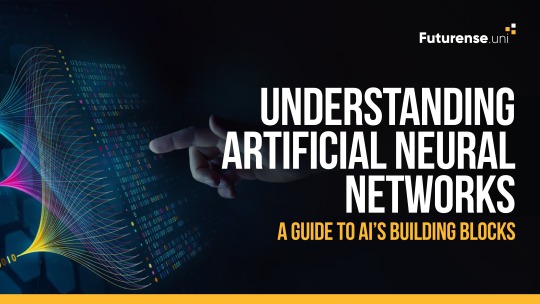
Have you ever wondered how Netflix recommends your next binge-worthy show or how Siri understands your voice commands? Behind these everyday marvels lies a revolutionary technology: artificial neural networks (ANNs).
URL: https://futurense.com/uni-blog/understanding-artificial-neural-networks-a-guide-to-ais-building-blocks
0 notes
Text
Study in Europe from Home with Futurense

Want to study in Europe? Futurense offers the best European program online to help you get into top universities. Learn at your own pace with expert teachers and get full support. Start your journey today. Don’t wait—your dream education is just a click away!
0 notes
Text
Professional Gen AI Training - Futurense's Certified Online Courses
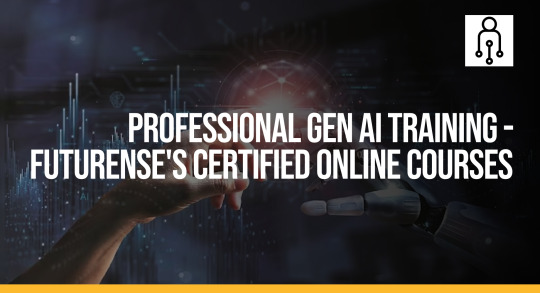
Futurense offers the best Gen AI courses online, designed by industry experts. Learn through interactive modules, case studies, and practical assignments that prepare you for AI jobs. Flexible schedules and certification included.
0 notes
Text
PG in Artificial Intelligence in India with Futurense
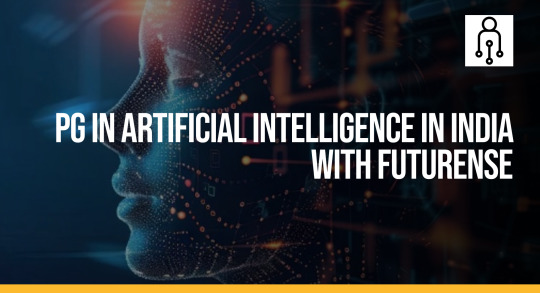
Start your PG in Artificial Intelligence in India with Futurense. Learn from top university experts, work on real industry projects, and get job-ready skills. No entrance exams are needed. Get global exposure and build a strong tech career with hands-on learning and career support. Apply now to secure your future in AI.
0 notes
Text
Achieve Your Dream with Futurense US Pathway

Are you ready to achieve your dreams in the USA? The Futurense US Pathway offers a unique pathway to a US Master’s degree, providing benefits such as reduced course duration, cost savings, and recognition from IITs/IIMs. Discover more about the Futurense US Pathway today!
0 notes
Text
How Nykaa’s Indrani Turns Data into Customer-Captivating Stories
youtube
Join Indrani from Nykaa as she reveals how AI transcends algorithms, transforming data into engaging customer stories. Learn why AI is for everyone, not just engineers, and how the Futurense Leadership Council is preparing future leaders. Discover practical AI applications for your role. Watch now and transform your work!
0 notes
Text
Common Mistakes Students Make While Applying to Universities Abroad

When deciding which abroad country is best for studies, a flawless application is your ticket to success. A well-prepared application not only highlights your academic and personal achievements but also demonstrates your commitment to pursuing higher education.
Read more: https://futurense.com/usp-blogs/common-mistakes-applying-universities-abroad
0 notes
Text
Futurense US Pathway: Your Path to Master’s with IITs, IIMs & Top US Universities
Ready to achieve your dreams in the USA? The Futurense US Pathway offers a unique US Master’s pathway with benefits including reduced course duration, cost savings, and IITs/IIMs status. Discover more at Futurense US Pathway today!
0 notes
Text
Studying in the USA vs. UK vs. Canada: Which One is Better for You?

The trend of studying abroad has grown significantly, with students flocking to top destinations like the USA, UK, and Canada for higher education. These countries are often considered the best abroad countries for studies, offering world-class academic opportunities, promising career prospects, and enriching cultural experiences.
Read more: https://futurense.com/usp-blogs/best-country-to-study-usa-uk-canada
0 notes
Text
One Year MBA Programs in USA

The landscape of business education is evolving, and many aspiring professionals are turning to one year MBA programs in the USA to accelerate their careers. Read more: https://futurense.com/usp-blogs/one-year-mba-programs-in-usa
0 notes
Text
MBA in Management Information Technology Systems in the USA: What You Need to Know
In an era where technology drives business innovation, organizations seek leaders who can seamlessly integrate IT strategies with organizational goals. Read more.
URL: https://viewsparrow.com/mba-in-management-information-technology-systems-in-the-usa-what-you-need-to-know/
0 notes
Text
Top 3 Best Engineering Courses For The Future With High Salary
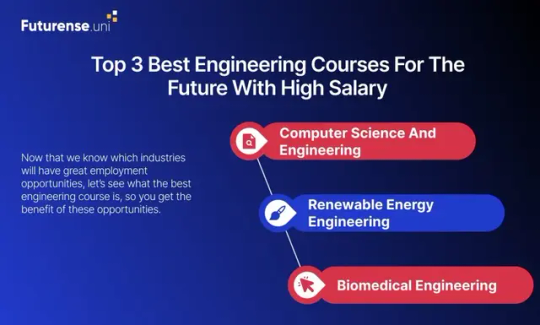
Now that we know which industries will have great employment opportunities, let’s see what the best engineering course is, so you get the benefit of these opportunities.
1. Computer Science And Engineering
Many aspects of this engineering course deal with software development, AI, machine learning, cybersecurity, and cloud computing. Along with the IT industry, engineers from this branch will also have job opportunities in other industries such as telecommunications. The top 3 places to study are:
Indian Institute of Technology (IIT) Bombay
Indian Institute of Technology (IIT) Delhi
Indian Institute of Technology (IIT) Kanpur
2. Renewable Energy Engineering
One of the best choices as the answer to which engineering course is best for the future, this course covers everything from solar power, bioenergy, wind energy, and other energy-efficient technologies. The best places to study are:
Indian Institute of Technology (IIT) Bombay
Indian Institute of Technology (IIT) Madras
National Institute of Technology (NIT) Warangal
3. Biomedical Engineering
The course is very varied and covers everything from medical device development to imaging systems, biotechnologies, and healthcare technology. This is the best engineering course to take if you are interested in the pharma or healthcare industry. The top 3 engineering colleges are:
Indian Institute of Technology (IIT) Bombay
Indian Institute of Technology (IIT) Delhi
Indian Institute of Technology (IIT) Kharagpur
So, when pursuing engineering after class 12, don’t limit yourself to only the traditional courses. Select from these best engineering courses and you can have a robust career in the future.
Website Name: Futurense
Website Url: www.futurense.com
0 notes